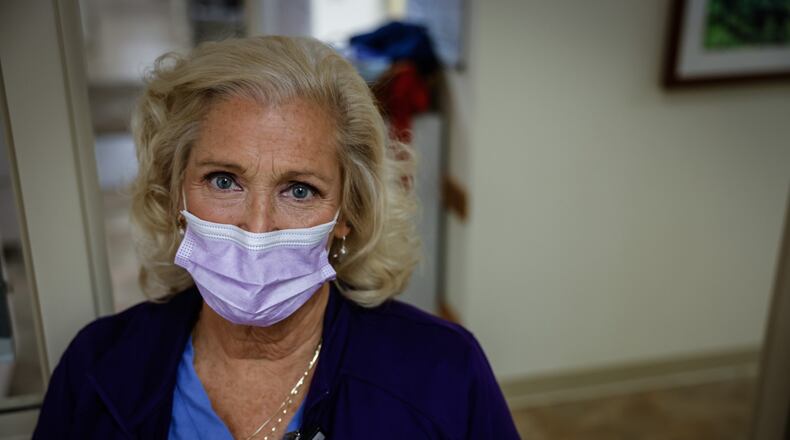“We really have been trying to impact the infant mortality and the maternal mortality rate in the county, because it’s terrible. It really is just not acceptable,” said Kitty Lowery-Collins, nurse midwife with Dayton-based Five Rivers Health Centers.
Midwives, however, are less integrated into care than in the U.S. than other parts of the world and are less integrated and autonomous in Ohio than the U.S. as a whole.
Previously, the Five Rivers Health Centers’ certified nurse midwives cared for patients during their pregnancy and after they gave birth. However, Five Rivers Medical Center is a host site that works with a rotating group of medical residents learning to be new doctors, and a resident physician was there leading care for the birth.
The health center network, headquartered near the former Good Samaritan Hospital, treats patients on a sliding-fee scale and is a hub of affordable medical, behavioral and dental care.
Lowery-Collins said she and the six midwives at Five Rivers generally work with patients who present as lower risk and are trying to stay with the same patients all through pregnancy.
“They appreciate seeing the same face and not having to tell their issues to a different person every time they are in,” she said. “They appreciate it and they are more likely to have more trust.”
For years, she said they’ve asked to add deliveries to the care they provide.
“So we did ante-partum care all the way up through delivery, then they saw someone else upstairs, and then they came back to us afterwards. It was almost like we were deserting them and I think that patients felt that disconnect,” she said.
Lowery-Collins said said the health center’s CEO Gina McFarlane-El advocated for years the midwives to be with the patients giving birth. Now they have an arrangement where the midwives are leading care and first-year medical residents observe to learn.
Previously, less than 50% of patients came back for follow up visits after giving birth but Lowery-Collins said, while it is early, it seems that more women are coming back for follow up care under the new model.
Midwives get results
The change at Five Rivers Health Centers reflects the broader push to increase the role of the midwife in the U.S.
Roughly 10% of United States births are attended by midwives, where in other countries like the U.K. and Japan, births are predominantly attended by midwives, according to Mimi Niles, midwife and faculty at NYU Rory Meyers College of Nursing, speaking at a panel on midwives hosted by Cleveland think tank Center for Community Solutions.
There were 428 certified nurse midwives in Ohio as of June 30, 2020. These midwives must be licensed by the Ohio Board of Nursing as advanced practice registered nurses and in Ohio and can’t practice autonomously, but have to have a written supervision agreement with a physician.
Along with managing care nursing deliveries, nurse midwives can provide a full range of preventative and primary health services, like annual gynecologic examinations.
Studies also show that women who received midwifery services experienced a lower chance of epidural usage, episiotomy, and the use of forceps and vacuum – also known as instrumental vaginal birth, said Natasha Takyi-Micah, policy association with Community Solutions, adding that is not an exhaustive list of differences.
The movement to elevate the role of the midwife is intertwined with efforts to put Black women in charge of their health and eradicate persistent racial disparities in mother and baby health.
Black women in the U.S., regardless of income, experience worse maternal outcomes than white women, including dying more often during childbirth. Making midwives and doulas widely accessible is one strategy associated with reducing infant and maternal mortality and addressing disparities.
Certified nurse midwife Da’na M. Langford, CEO of Village of Healing, said she’s exhausted with the data gathering and meetings instead of action addressing racism, not just programs addressing lower-socio economic women. She urged more support for Black-led organizations and Black midwives.
“I continue to give bus tickets to our clients, but bus tickets are not going to help with racism. So what we need to do is make sure that we’re truly addressing what’s happening,” Langford said.
About the Author

